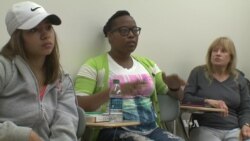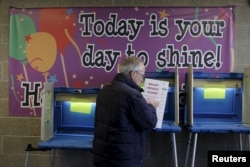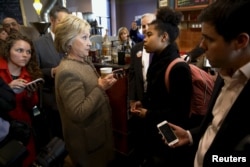Student Union
Alienated, Unhappy With Choices, Many Young US Adults Shun Voting
It’s a Wednesday afternoon American government class in the diverse Washington suburb of Alexandria, Virginia. A group of students is arguing passionately and thoughtfully about gun control. They represent a range of ethnicities and races, but they are all young.
They’re attending an affordable college to earn a degree so they can get good jobs — but they have no interest in voting.
Presidential front-runners Donald Trump and Hillary Clinton’s historic negative ratings among American voters will probably do little to change their minds and an unfortunate reality from the last presidential election: Only about half of all Americans eligible to vote actually go to the voting booth.
According to Pew Research surveys of the 2014 and 2012 general elections, nonvoters overwhelmingly tend to be from groups that could be most impacted by government policies, like these students.
“Nonvoters tend to be younger, more financially strapped, more likely to be minorities. People who are likely voters tend to be older, whiter, more financially secure,” says Carroll Doherty, director of political research at the Pew Research Center.
Unhappy with choices
The students say the choice not to vote is brought on by a lack of choice.
“I joke around all the time in class and say, ‘I wish we could just reroll the dice and get some new candidates because these guys are just crazy,' ” says Cody Berges, 24, who served in the military and now wants to study history.
Berges is attracted to Trump’s proposal to prevent illegal immigration with a border wall but says the candidate “just seems overly extreme on the conservative side, and Bernie Sanders seems like a socialist in most people’s eyes, and Hillary seems like she would be too liberal for the moderates in the middle.”
He voted for Marco Rubio in the Virginia primary election, but Berges says Election Day in November will be difficult.
“I want to go vote," he says, "but if I can’t support someone wholeheartedly, then I can’t go.”
Put off by past, passion
According to Doherty, more than a third of nonvoters are under 30. The frustration echoed by Derges’ classmates helps reveal why that may be.
“We are uninformed, but it’s not because we don’t care,” says sophomore Rob Carter, 20. “I think it’s because the landscape of politics that Hillary represents, and that’s been represented since we were kids, has been alienating us.”
Like many nonvoters, Carter describes himself as leaning liberal on political and social issues. He says he can’t see himself ever voting until there is a change in politicians’ tone.
“I don’t like the extremist atmosphere that is politics nowadays — sort of the shouting, who is more extreme, who is more passionate,” he says.
Carter sees Trump’s blunt, unfiltered style as a possible way out.
“He’s like a TV show character but so calculated and good," he says. "I respect that, and I hope that’s what politics are in the future — not acting as much.”
Relatable candidates
“Secretary Clinton was my role model back in middle school,” says junior Lauren Reyes, 21. She says she thought Clinton was “the greatest thing on the planet,” but she won’t vote for her in the first presidential election she’s eligible to vote in.
“The way that she’s trying to acquire votes from people of color and from minorities is incredibly embarrassing on her part,” Reyes says of how Clinton lost her vote. “I know she’s trying to relate to what people are doing, but it’s hard to relate when you haven’t had to go through what they go through.”
Many of the students described the remaining presidential candidates as “characters” or “reality show candidates.” They said they wanted a candidate who could relate to their personal experiences.
Relatability is particularly important when considering the demographic makeup of a nonvoter. Doherty says there is “a very strong racial gap” between white voters and minority nonvoters, and the differences in financial background are even more striking.
“Only about half of nonvoters told us they had a credit card,” he said. “They’re less likely to attend college and have lower incomes.”
Morality of voting
“I’m just really confused,” says Reyes, whose mother emigrated from El Salvador. “Should I vote? Should I not vote? It’s morally confusing.”
She cares deeply about reproductive rights and immigration but sees no alternatives beyond Clinton. Reyes will count among the millions of so-called disengaged voters this election, but she is engaged enough to note that local and state elections often mean more for daily life.
An April 2016 Rasmussen poll found that 6 percent of Americans said they would stay home if the choice was between Trump and Clinton. That decision is particularly difficult for freshman Carolina Escalante, 18. The daughter of two Salvadorian immigrants who fled to the United States says she will not vote in her first election because she already understands the impact her choice can have.
“I don’t want to make a decision, then maybe one of these candidates will do something,” she says. “I shouldn’t be like, ‘Oh, I voted for him,’ and feel guilty about it.”
See all News Updates of the Day
Harvard students end protest as school agrees to discuss Gaza conflict
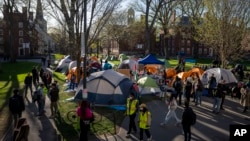
Protesters against the war between Israel and Hamas were voluntarily taking down their tents in Harvard Yard on Tuesday after university officials agreed to discuss their questions about the endowment, bringing a peaceful end to the kinds of demonstrations that were broken up by police on other campuses.
The student protest group Harvard Out of Occupied Palestine said in a statement that the encampment "outlasted its utility with respect to our demands." Meanwhile, Harvard University interim President Alan Garber agreed to pursue a meeting between protesters and university officials regarding the students' questions.
Students at many college campuses this spring set up similar encampments, calling for their schools to cut ties with Israel and businesses that support it.
The Israel-Hamas war began when Hamas and other militants stormed into southern Israel on October 7, killing some 1,200 people and taking 250 hostages. Palestinian militants still hold about 100 captives, and Israel's military has killed more than 35,000 people in Gaza, according to Gaza's Health Ministry, which doesn't distinguish between civilians and combatants.
Harvard said its president and the dean of the Faculty of Arts and Sciences, Hopi Hoekstra, will meet with the protesters to discuss the conflict in the Middle East.
The protesters said they worked out an agreement to meet with university officials, including the Harvard Management Company, which oversees the world's largest academic endowment, valued at about $50 billion.
The protesters' statement said the students will set an agenda that includes discussions on disclosure, divestment, reinvestment and the creation of a Center for Palestine Studies. The students also said that Harvard has offered to retract suspensions of more than 20 students and student workers and back down on disciplinary measures faced by 60 more.
"Since its establishment three weeks ago, the encampment has both broadened and deepened Palestine solidarity organizing on campus," a spokesperson for the protesters said. "It has moved the needle on disclosure and divestment at Harvard."
Chinese students report interrogations, deportations at US airports
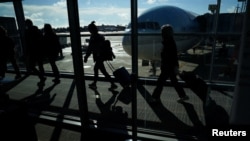
Academics from China are reporting increased scrutiny at U.S. airports, with valid visa holders being interrogated and turned away by Customs and Border Protection Agents.
Phones and laptops have been searched, and researchers have undergone extensive questioning about their work. One graduate student at Yale, who was midway through her PhD, was turned back at Dulles airport and banned from entering the U.S. for five years, according to The Guardian.
- By Phil Mercer
Australia plans limits on international students
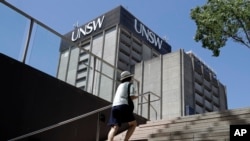
Australia says it will impose limits on the number of international students coming into the country to ease stress on housing and to reduce immigration.
The government in Canberra has said that international education programs, under which foreign students come to study in Australia, were fertile ground for immigration and visa fraud.
In 2023, official figures show that 787,000 international students studied in Australia, exceeding levels seen before the COVID-19 pandemic.
The Canberra government plans to cap the number of overseas students to ease stress on rental accommodation and to curb levels of immigration.
Senior government ministers have said caps for education would be part of a broader plan to manage migration, increase the availability of housing and to address skills shortages in the economy.
However, the university sector has insisted the proposals would damage Australia's global reputation as a welcoming, safe and world-class destination for students from other countries.
Education has been one of Australia’s most lucrative exports, but the left-leaning government in Canberra has said the international education sector, which includes many smaller private English language colleges, vocational and training institutions as well as larger universities, has been used as a way for unskilled migrants to stay in Australia.
Michael Wesley, the deputy vice chancellor at the University of Melbourne, told the Australian Broadcasting Corp. Tuesday that he hopes the government will target unscrupulous education providers.
“We welcome the crackdown on non-genuine education providers, which provide a backdoor into permanent residency for people who are not genuine students," Wesley said. "We are confident that all of our international students are genuine students and, so, we would hope that the impact of these visa caps will be at the non-genuine end of the education sector.”
Rental accommodation in many of Australia’s larger cities is often expensive and in short supply.
Analysts have said that surging prices are the result of years of underinvestment in affordable housing.
Education institutions would be required to build accommodations for their students if they wanted to exceed limits of the caps. Specific quotas for international students have not yet been made public.
The government in Canberra said it will change Australia’s Education Services for Overseas Students Act to give the education minister the authority to set limits on student enrolments for each education establishment, including specific courses or locations.
The majority of overseas students in Australia come from five countries: China, India, Nepal, the Philippines and Vietnam, according to government data. They contribute billions of dollars to the Australian economy.
Canada limits international student visas
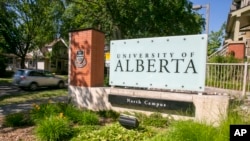
Saying the country has seen a massive spike in temporary immigrants – such as foreign workers – Canadian Prime Minister Justin Trudeau announced caps on international student visas.
Canada hosted more than 1 million international students in 2023, according to the Washington Post. That’s the same number as the United States, a country eight times its size. (April 2023)
Protests dwindle to tiny numbers, subtle defiant acts at US college graduations

A tiny contingent of Duke University graduates opposed pro-Israel comedian Jerry Seinfeld speaking at their commencement in North Carolina Sunday, with about 30 of the 7,000 students leaving their seats and chanting "free Palestine" amid a mix of boos and cheers.
Some waved the red, green, black and white Palestinian flag. Seinfeld, whose decade-long namesake show became one of the most popular in U.S. television history and who continues to draw legions of fans to his Netflix specials and TV appearances such as "Comedians in Cars Getting Coffee," was there to receive an honorary doctorate from the university.
"After spending four years at what is considered one of the finest institutions of higher education in the world, they apparently feel that perhaps some light entertainment will get you all to the final realization, 'You know, I think I've really had enough of this place,'" Seinfeld said.
The stand-up turned actor and recent star, director and co-writer of the movie "Unfrosted," has publicly supported Israel since it invaded Gaza to dismantle Hamas after the organization attacked the country and killed some 1,200 people in southern Israel on Oct. 7. The ensuing war has killed nearly 35,000 people in Gaza, mostly women and children, according to Gaza's Health Ministry, which doesn't distinguish between civilians and combatants.
Students at campuses across the U.S. responded this spring by setting up encampments and calling for their schools to cut ties with Israel and businesses that support it. Students and others on campuses whom law enforcement authorities have identified as outside agitators have taken part in the protests from Columbia University in New York City to UCLA.
At the University of California, Berkeley, on Saturday, a small group of pro-Palestinian demonstrators waved flags and chanted during commencement and were escorted to the back of the stadium, according to the San Francisco Chronicle. There were no major counterprotests, but some attendees voiced frustration.
"I feel like they're ruining it for those of us who paid for tickets and came to show our pride for our graduates," said Annie Ramos, whose daughter is a student. "There's a time and a place, and this is not it."
The small student protest Sunday at Duke's graduation in Durham, North Carolina, was emblematic of campus events across the U.S. Sunday after weeks of student protests roiled U.S. campuses in recent weeks and resulted in nearly 2,900 arrests at 57 colleges and universities.
This weekend's commencement events remained largely peaceful.
At Emerson College in Boston, some students took off their graduation robes and left them on stage. Others emblazoned "free Palestine" on their mortar boards. One woman, staring at a camera broadcasting a livestream to the public, unzipped her robe to show a kaffiyeh, the black and white checkered scarf commonly worn by Palestinians, and flashed a watermelon painted on her hand. Both are symbols of solidarity with those living in the occupied territories.
Others displayed messages for a camera situated on stage, but the livestream quickly shifted to a different view, preventing them from being seen for long. Chants during some of the speeches were difficult to decipher.
Protests at Columbia University, where student uprisings inspired others at campuses across the country, led the school to cancel its main graduation ceremony in favor of smaller gatherings.
The University of Southern California told its valedictorian, who publicly backed Palestinians, that she could not deliver her keynote speech at its graduation ceremony because of security concerns. It later canceled its main graduation ceremony.
At Depaul University in Chicago, graduation is more than a month away. But as the academic year closes, school leaders said they had reached an "impasse" with the school's pro-Palestinian protesters, leaving the future of their encampment on the Chicago campus unclear.
The student-led DePaul Divestment Coalition, which is calling on the university to divest from economic interests tied to Israel, set up the encampment nearly two weeks ago. The group alleged university officials walked away from talks and tried to force students into signing an agreement, according to a student statement late Saturday.




